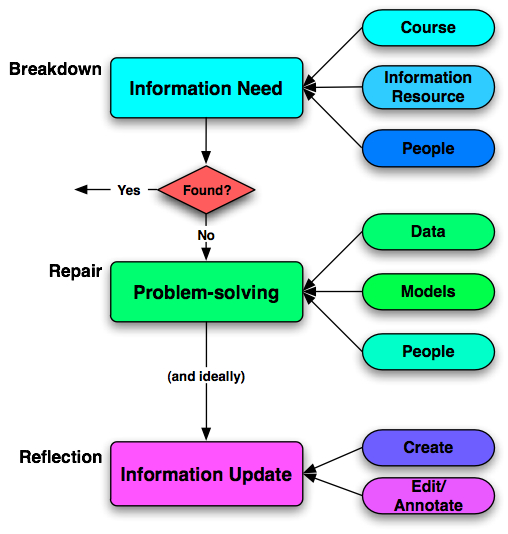 In the process of thinking through how to support informal learning, I was reminded of a diagram I created several years ago. I started from an approach based upon philosophy that talked about acting in the world: you act in the world when you can, and when you have a breakdown you need to solve it, so you repair, and then reflect and learn so you can act more competently the next time (Ok, so it’s an idealized model). What it led me to think was that when we have a need, we first try to find the answer. If we don’t, then we have to do more extreme steps of actively trying to solve it, and then ideally we save that answer so that others don’t have to solve the same problem (see what I said about ‘ideal’?).
In the process of thinking through how to support informal learning, I was reminded of a diagram I created several years ago. I started from an approach based upon philosophy that talked about acting in the world: you act in the world when you can, and when you have a breakdown you need to solve it, so you repair, and then reflect and learn so you can act more competently the next time (Ok, so it’s an idealized model). What it led me to think was that when we have a need, we first try to find the answer. If we don’t, then we have to do more extreme steps of actively trying to solve it, and then ideally we save that answer so that others don’t have to solve the same problem (see what I said about ‘ideal’?).
Without going into all the thinking (it’s elaborated more in several places, including this white paper; PDF), the point is that supporting people in performance includes not just courses, but content and job aids, and connections to people. Note that when it moves from information need to problem-solving, the people will change because there isn’t an expert (or you’d have the answer already).
The interesting thing for me is that this provides a strong justification for using social networks in learning: wikis can be places where people can store the information about problems they’ve solved, discussion boards and profiles fill the need of finding expertise, blogs may support people in their problem-solving as well, serving as a way to share questions and get feedback. The social network provides the rest of the support around the courses which really only serve the situation where a major skill-shift change is needed.
So, it’s probably just buttressing the obvious, but I get a degree of comfort from taking a pre-existing model and using it to create a framework which then turns out to map to something I’m deeply involved in. Does it make sense to you?
Quick and to the point, Clark. I especially appreciated the breakdown of tools, and the roles by which they support learning.
Rudy
Love the diagram, which helped me explain more clearly why we need things other than courses.
Thanks! Rudy, yes, that’s the way I try to think about it, learning role first, tool second. And, yes, Lydia, that’s one of the implications I like to highlight.
This model goes WAY beyond education! My grown daughters sometimes get annoyed with me when I present modeled ways of solving problems similar to yours! This model can be used to solve any issue, including the ubiquitous relationship problem!
Thanks for a great approach and one that I can throw at my daughters the next time they have any problems!
I like the diagram (is it free to use with attribution?). I particularly like the distinction about people between first and middle level. I do have a question regarding “Reflection.” Could it also be at the top of the diagram as well? And, linked to Yes for when the info is partially found (problem solved) and modified?
Regarding the top, what about the information one receives which isn’t needed to resolve a breakdown? This happens to me all of the time. I’m stuck on how to organize this information or capture it for that unknown future breakdown…
Thanks for sharing your brilliance!
Rochelle, thrilled if it provides a useful framework! I love models; I think they’re the key to more successful problem-solving (including relatonships :). BTW, I like the book “Crucial Conversations” on that topic, though it’s still more of a case of ‘do as I say’, sadly.
Stacy, yes, it’s free to use with attribution, (see the Creative commons spec in the sidebar).
Re: reflection, I do mean capturing when you have actively had to solve a problem, but yes, if you did have insights when just finding the answer, capturing that would be welcome (though perhaps you’re at least implicitly going through problem-solving?).
Not quite sure what you mean about information that’s not needed to resolve a breakdown. Info overload? Of course, you may have some breakdowns that have been hanging around unsolved, and then you serendipitously find the answer. Storing for unanticipated problems is interesting, but not sure it falls from *this* diagram, which is about when you *do* have breakdowns. Maybe time for another diagram/model? (Tho’ really just flows into our basic memory stuff, ala Medina, no?)
Yes, thanks Clark, for the book suggestion. I just ordered it! My daughter manages a homeless shelter so she should find the book helpful!